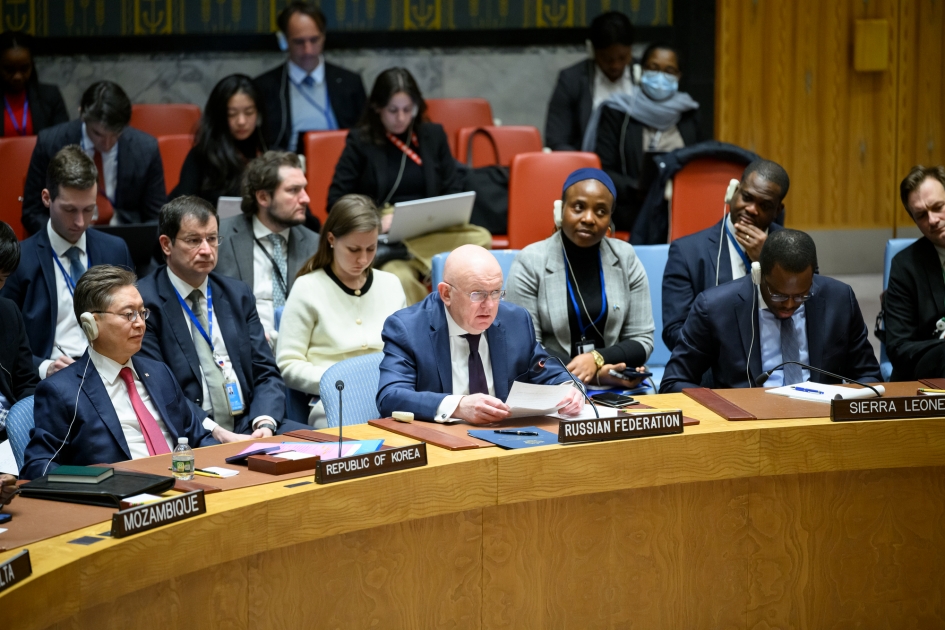Explanation of vote by Permanent Representative Vassily Nebenzia at the UNSC vote on a draft resolution on a ceasefire for Gaza
Before the vote on the Russian amendment to a draft resolution on a ceasefire for Gaza:
Mr.President,
We are very disappointed and puzzled by the way in which the draft resolution has been worked on in the past 24 hours. It was just an hour before the meeting when we learned that the word "permanent" in OP1 in relation to the ceasefire was to be replaced by a weaker language. That is unacceptable. We all received instructions to vote on the text that had the word "permanent" in it; we believe that this is fundamentally important. All other language leaves too much room for interpretation, which could allow Israel to resume a military operation in the Gaza Strip at any time after the expiration of the ceasefire, which we hope will be established today.
To avoid this, we want to introduce an oral amendment and get the word “permanent” back in OP1 to make it sound as proposed in the initial edition. “Demands an immediate ceasefire for the month of Ramadan respected by all parties, leading to a permanent sustainable ceasefire and also demands the immediate and unconditional release of all hostages as well as insuring humanitarian access to address the medical and other humanitarian needs and further demands that the parties comply with their obligations under international law in relation to all persons they detain”.
Thank you.
After the vote on a draft resolution on a ceasefire for Gaza:
Mr.President,
Colleagues,
Russia voted in favor of the draft that had been put forward by the ten non-permanent members of the Security Council.
It is fundamentally important that for the first time the UNSC demands the parties to an immediate ceasefire, albeit only for the duration of the month of Ramadan. Unfortunately, what is going to happen afterwards is still unclear, as the language "lasting" can be interpreted in different ways, and this is quite telling. Those who stand with Israel want it to have a "free hand". We do want to believe that this language will be used in the interest of peace and not to advance Israel's inhumane operation against the Palestinians. The wording "permanent" would have been more accurate. We are disappointed that it did not pass. But we still believe that it is fundamentally important to vote in favor of peace. Nevertheless, the Council must continue to work towards a permanent ceasefire. We also note the demand in the resolution for the immediate and unconditional release of the hostages.
On March 22 the Security Council lived through another sad page of its history, when intrigue and blackmail tried to push the Council down the wrong path and force it to adopt a document that not only did not contain a direct demand or at least a call for a ceasefire, but actually gave, as the Permanent Representative of Algeria said, "a license to continue killing Palestinians”. Neither we nor our Algerian and Chinese colleagues could allow that to happen.
From the first day of the escalation in the Palestinian-Israeli conflict zone, the Russian delegation has called on UNSC members to respond to the unprecedented outbreak of violence with a clear and unequivocal demand for an immediate permanent ceasefire in the Gaza Strip, fulfilling its mandate to maintain international peace and security.
Today, as our amendment was voted, we saw once again the true face of our Security Council colleagues and saw for ourselves who really want for Israel's inhumane operation to end rather than just be put on hold.
We would like to draw attention to the following. What happened today is a response to those who criticize the veto power of P5 members of the Council. If Russia and China had not used veto on March 22, instead of a short text capable of stopping the violence in Gaza, we would have had a harmful US-proposed text that not only failed to demand a ceasefire, but actually gave Israel a license to continue its actions against the Palestinians, including in Rafah.
Before I conclude, I would like to remind the representatives of the United States, who time and again accuse the Council of failing to condemn the attack on Israel and keep blaming Russia for not condemning the terrorist attack of 7 October, that on 18 October the US delegation had the opportunity to pass the Brazilian draft resolution which envisaged an unequivocal condemnation of the events of 7 October and humanitarian pauses. Moreover, that draft had language that Washington insisted on. I also remind that the delegation of Russia abstained on the Brazilian draft, whereas the US delegation vetoed it. Therefore, you have only yourselves to blame. We cannot go back to this point indefinitely, because in the six months since October 7, Israel has responded to the actions of Hamas, which have been repeatedly condemned by all members of the Security Council in their national capacity, with inhumane crimes and collective punishment of the Palestinian people, resulting in the deaths of more than 32,000 innocent civilians, most of them women and children. Just think about this.
May I also remind Russia immediately and unequivocally condemned what happened on October 7, and there is no need to continue to speculate on this subject. We know first-hand what international terrorism is. Unfortunately, we have faced a monstrous manifestation of the beastly face of terrorism once again. On March 22, a terrorist attack in Russia claimed the lives of at least 143 innocent citizens, who were shot dead in cold blood. Back in 1990s, we also encountered manifestations of terrorism that took an extremely heavy toll on us.
We appreciate the support of all those who expressed their condolences to us today.
Thank you.
